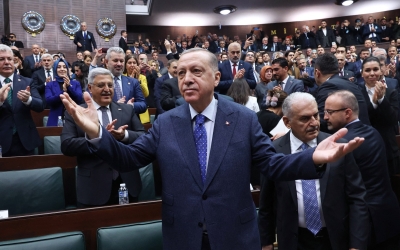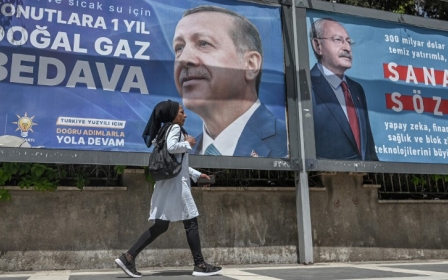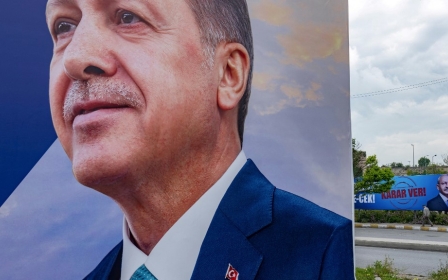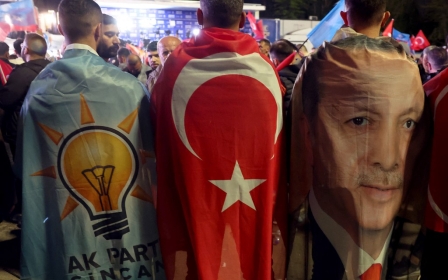Turkey's anti-refugee landscape leaves Syrians with just one choice
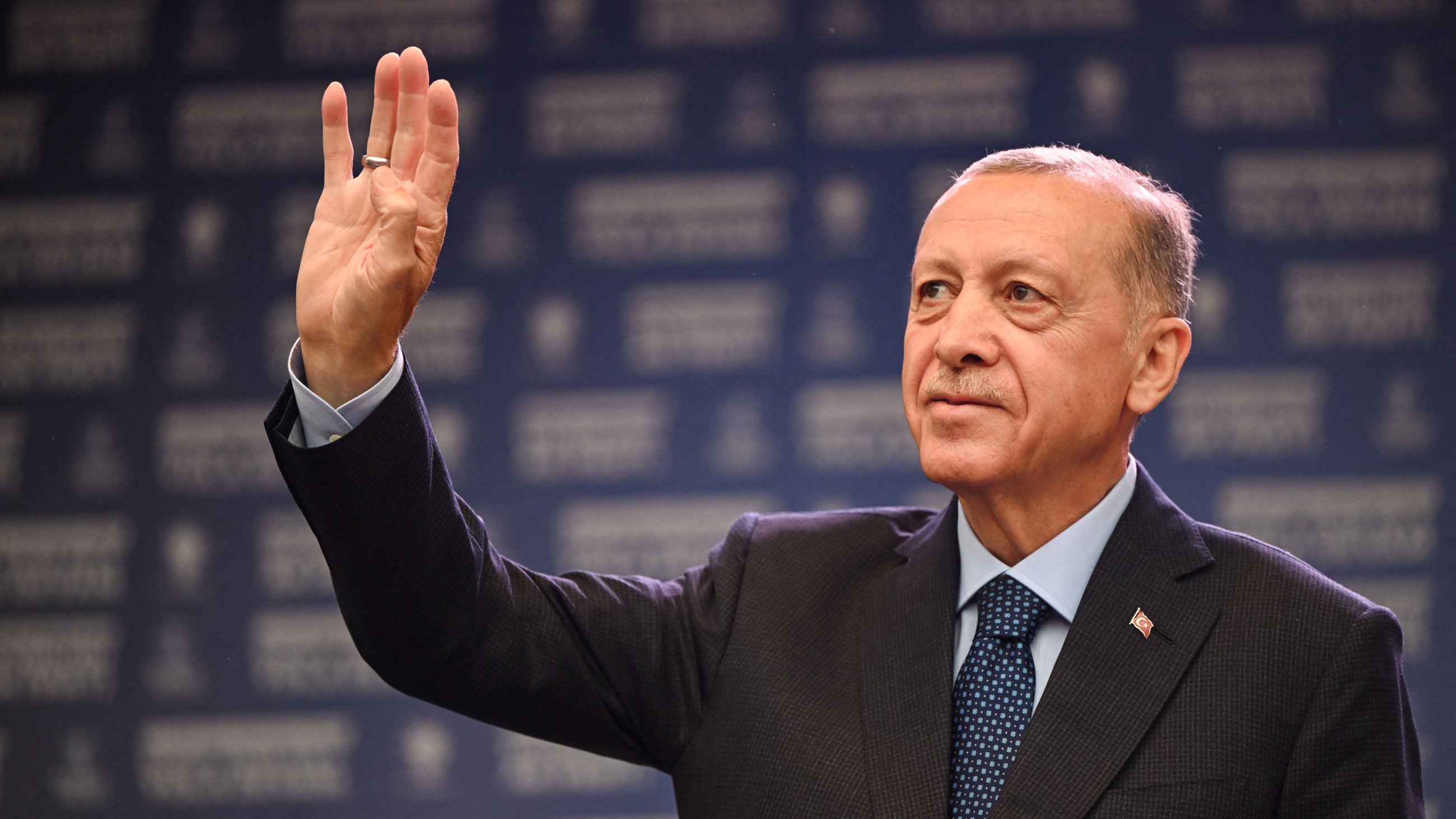
Campaign posters dotting the streets of Istanbul show a stern-looking Kemal Kilicdaroglu, the opposition presidential candidate, with a simple message as he seeks to woo voters: "Syrians will go back!"
Kilicdaroglu, the head of the Republican People's Party (CHP) and who is backed by a six-party opposition alliance, had until recently sought to project himself as a grandfatherly figure hoping to steer the country towards freedom, democracy and love. But for Syrians, Kilicdaroglu's recent messaging hasn't been one of love.
Kilicdaroglu aims to square his purported aims of returning the country towards democracy and the rule of law with threats to send millions of refugees back to a war zone, a feat that would fly in the face of international law.
Kilicdaroglu's anti-refugee rhetoric received a seal of approval this week when Turkey's far-right Victory Party leader, Umit Ozdag, who has relentlessly campaigned to send Syrians back, threw his weight behind the opposition leader.
"Syrians are generally concerned with how the candidates are dealing with the immigration issue," *Kristal Ates, who used a pseudonym, told Middle East Eye.
New MEE newsletter: Jerusalem Dispatch
Sign up to get the latest insights and analysis on Israel-Palestine, alongside Turkey Unpacked and other MEE newsletters
All Syrians Middle East Eye spoke with were afraid to speak on the record out of fear that they could face reprisals. Many more Syrians refused to speak outright, even off the record.
'Frustrating level of ignorance'
During his campaign, Kilicdaroglu accused President Recep Tayyip Erdogan's government of allowing "ten million" refugees into the country, sharply inflating official estimates of Turkey's refugee population. When Ates heard that figure, she said she felt like she "wanted to suffocate the guy for his lies".
Kilicdaroglu then claimed that the number of "irregular" migrants could spiral to 30 million in the next few years.
"It's so frustrating, the level of ignorance people have about the people they live next to and work with," Ates, 25, said.
Ates, who works at a media organisation and is now a Turkish citizen, said she'll be voting on Sunday for Erdogan.
"I feel safer having citizenship now," she said, "but I'm not very comfortable telling people that these days."
When Ates went to vote on 14 May, she felt a sigh of relief when no one said anything offensive to her. "It's very obvious I'm a foreigner," she said, alluding to her Arabic-sounding name.
"Yet I did feel paranoid and kept listening to hear what, if anything, they'd be saying behind my back."
That feeling of paranoia and being on guard is one many Syrians have had to deal with for years, and it has become particularly acute during the election period.
When Erdogan secured 49.4 percent of the votes in the first round of the election, many Syrians MEE spoke with heaved a sigh of relief. Kilicdaroglu received 44.9 percent of the votes, in what was seen as the biggest electoral challenge to Erdogan's 20-year rule.
Nonetheless, the everyday habits of Syrians have changed.
'Elections based on fear and humiliation'
"Syrians have generally avoided engaging in political discussions and refrained from going out in public unless necessary," Yahya, 25, told MEE.
Yahya arrived in Turkey over a decade ago, as the Syrian conflict descended into a full-blown civil war. He's in the process of finishing a master's degree in mathematical engineering in Istanbul and this is the first election he has been eligible to vote in.
Yahya said he voted for Erdogan in the first round and will do so again in the second.
Like many other Syrians who managed to get Turkish citizenship, Yahya officially changed his name to a more Turkish sounding one to "avoid racism in both government and private institutions".
While changing your name to a more Turkish one is not a requirement to receive citizenship, many have opted for the voluntary process in a bid to better blend into society and avoid having to talk about their Syrian background.
The UN Refugee Agency says Turkey hosts around 3.9 million refugees, the majority of whom have fled the conflict in neighbouring Syria.
Yahya said that, because of the "fear and humiliation"Syrians have experienced from opposition speeches, Syrians started to avoid speaking Arabic in public places and limited their outings.
Last-ditch attempt
Earlier this week, MEE reported cracks emerging in the Turkish opposition following Kilicdaroglu's anti-immigrant rhetoric, with several members of one of the smaller opposition parties resigning.
In their resignation letter, the signatories, who called themselves Democrat Muslims, said: "Here we openly declare to the public: We will not be on the side of those who defend anti-immigration in a way that will trample human dignity."
It added: "We will not stand by a language that insults refugees who take refuge in our country and have no other purpose than to live and survive in safety and peace."
Kilicdaroglu's last-ditch attempt to target refugees stands in marked contrast to Erdogan's stance. Two days before the elections on 14 May, the Turkish president vowed that Syrians would not be forced to return to a war zone.
Mohamed, 29, told MEE: "It is enough to examine the degrading rhetoric the opposition has engaged in over the last five years. This rhetoric seeks to isolate Syrians in Turkey socially and culturally."
On Sunday, Mohamed, who has Turkish citizenship and also changed the spelling of his name to have "peace of mind", said he would vote for Erdogan again.
"While I feel relatively safer, I'm thinking about other millions of fellow Syrians who are living in fear during this moment," he said.
* All names have been changed for security reasons
Middle East Eye delivers independent and unrivalled coverage and analysis of the Middle East, North Africa and beyond. To learn more about republishing this content and the associated fees, please fill out this form. More about MEE can be found here.



